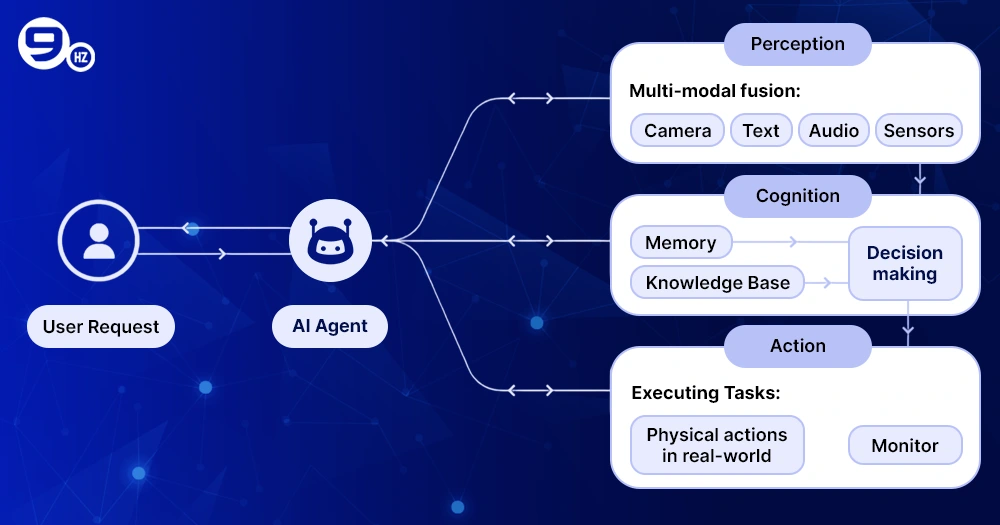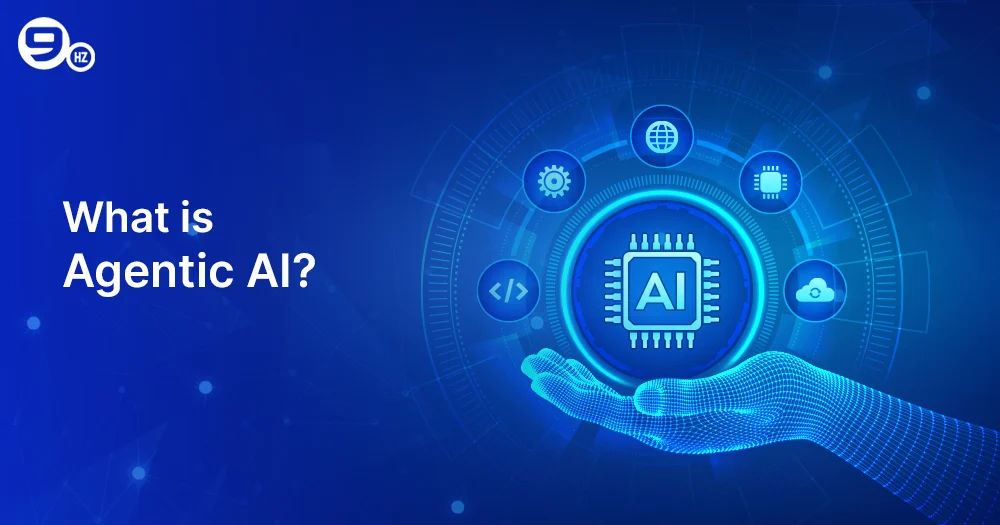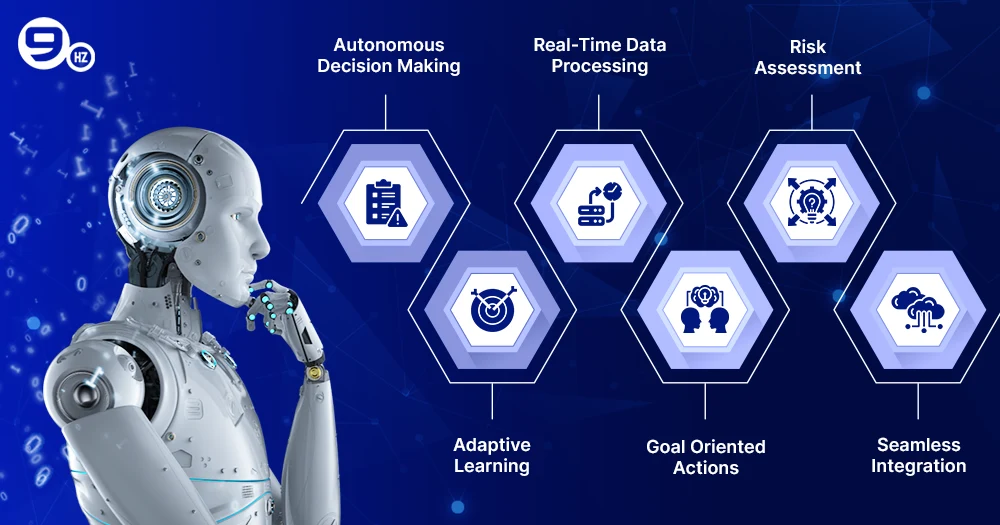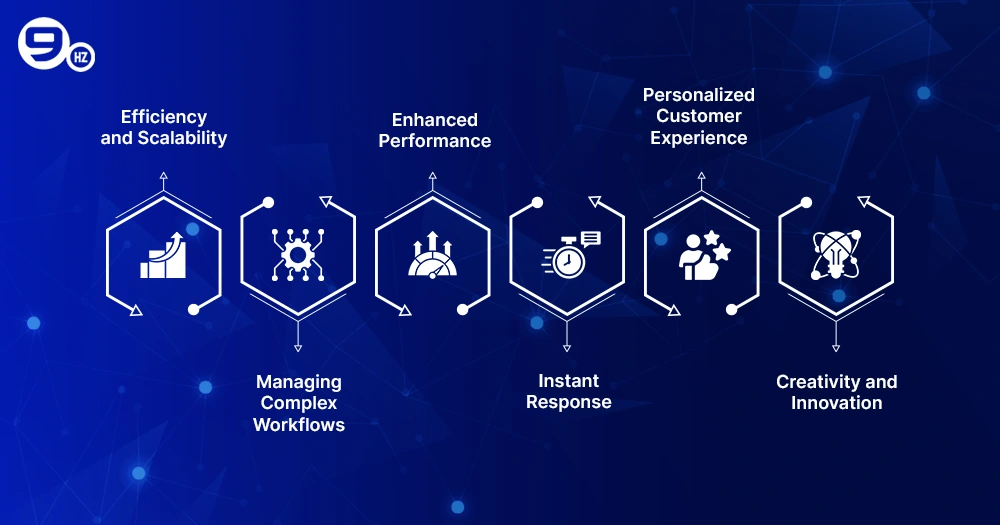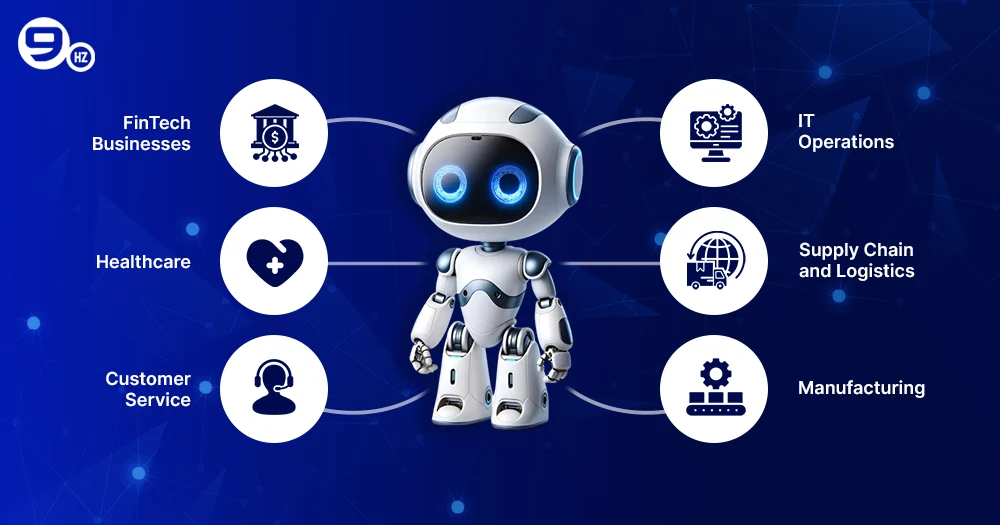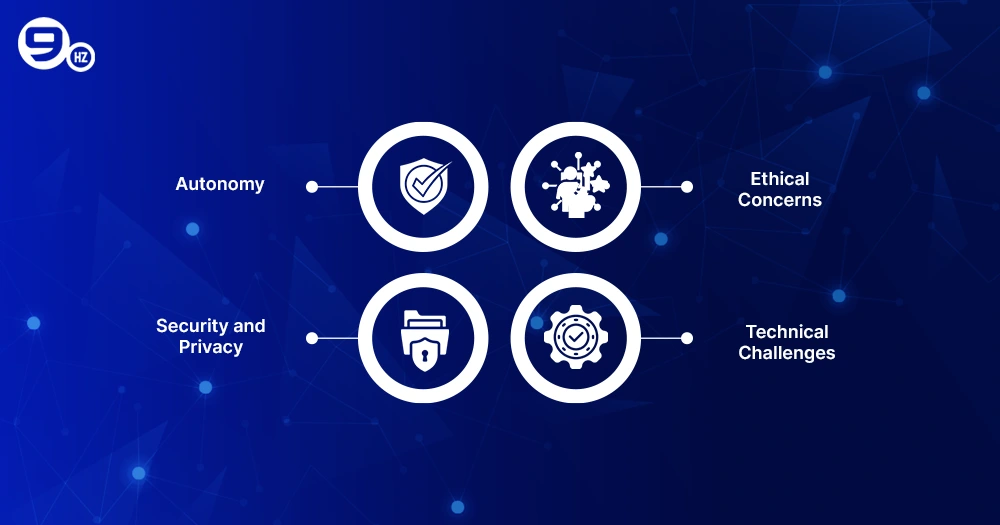The evolution of generative AI and chatbots has significantly transformed how businesses connect to their customers and provide personalized experiences. A lot of tasks that used to consume days and weeks now require a few hours and an AI expert to complete. However, as time advances, the need for a tool that doesn’t only provide the answers and generate texts emerges. That’s where we witness Agentic AI. If you are also one of the enthusiasts looking for the answer to what agentic AI is and how it works, and how agentic AI development services can help bring these advancements to your business, you are in the right place.
According to data, the Agentic AI market has been valued at $5.1 billion in 2024 which is continuously growing with a CAGR of 44%. The market is expected to achieve a valuation of $47 Billion by the end of 2030. The quick and continuous growth of the market might bring a lot of business opportunities and all it takes is an AI development company that can bring those oppotunities to you.
So, have a glance at this article and by the end of the page, you will have answers to how does agentic AI work annd all your questions regarding agentic AI.
How Does Agentic AI Work?: Detailed Breakdown
Agentic AI consists of numerous AI agents working collaboratively, exchanging information, and performing tasks. The overall working mechanism can be divided into 4 simple steps-
1. Perceive
The working process of agentic AI applications begins with gathering and processing data from various sources like sensors, databases, and other digital interfaces. In this step, the agentic AI focuses on identifying the relevant entities and objects from the external environment.
2. Reason
Once the agentic AI has identified the goal and collected the relevant data from the sources, the large language model incorporated in the software acts as the reasoning engine. The large language model plays a significant role in executing functions like visual processing, content creation, and power recommendation. RAG (retrieval augmented generation) technique is often used by the agentic AI to access the real-time and latest information to provide accurate outputs.
3. Act
The application programming interfaces help in the seamless integration of external tools and software that helps the agentic AI perform tasks based on pre-defined rules. At the same time, it also ensures that the action has been taken within the defined limit so that it doesn’t break the rules defined by the user or business. For example, if the agentic AI application is designed to settle a claim of up to $100, it can not allow the settlement for customers about the defined amount.
4. Learn
Once a certain action has been executed by the agentic AI, it grabs the learning from that particular action and also records if the user made any specific alteration in between the tasks. This learning helps the agentic AI to provide a better user experience in the future and increase overall performance over time.
What is Agentic AI?
Agentic AI is the more advanced form of artificial intelligence that can act autonomously while adapting user behavior and thus solve complex problems according to pre-defined contexts and objectives. Agentic AI technology architecture consists of multiple AI agents working simultaneously while leveraging large language models (LLMs) and complex reasoning. The combination of technologies and learning capabilities helps the agentic AI to make smart decisions, perform practical tasks, and offer a seamless user experience.
While the traditional AI software was designed to help users in research, get direct answers, and leverage a chat-based interface, the agentic is designed to perform complex tasks and help the users automate their repetitive tasks to enhance the workflow. The automated tasks require minimal or no human intervention to achieve the defined objectives and results.
Key Components of Agentic AI
Agentic AI is a concept that is designed to help diverse industrial businesses automate their workflow. Thus, by partnering with the right agentic AI development company, businesses can build their personalized AI agentic for particular tasks or processes. All this is possible only because of the different components that help to build customized Agentic AI.
Here are the three key components of Agentic AI-
1. Prompt
As suggested by the name, prompting helps outline a roadmap for agentic AI. The roadmap ensures that agentic AI operates in an ideal way in order to achieve the defined goals and mitigate the challenges. The prompt helps to define the key responsibilities of all the agents in a multi-agent system (integrated into the Agentic AI architecture). It further plays a core role in the efficient delegation of responsibilities between the agents for the smooth execution of complex tasks.
2. Memory
This is a core part of agentic AI which is responsible for storing all the required information, knowledge, and experiences. The memory makes sure that the agentic AI solution can learn about the users, track their preferences, and thus execute the task accordingly in the future to provide a better user experience. Memory is more connected to the LLM model integrated into the software that helps bring out the relevant information when the command is provided by the user.
3. Tools
There are various tools integrated into the agentic AI that help to perform the tasks and achieve the objective. It includes a range of APIs that bring information, connect different parts of the overall system, and help them to work collaboratively. For example, a single agent system goes through different phases like natural language input, interpretation & reasoning, workflow generation, workflow execution, and generating output.
What Are the Key Differences Between Agentic AI and Generative AI?
According to Statista, the global generative AI market has been valued at $63 billion in 2025 which is way higher as compared to agentic AI. So, there is no doubt that people are more familiar with generative AI due to tools like ChatGPT, Gemini, and Perplexity. The popularity of these tools among the end user often leads to confusion between generative AI and agentic AI.
So, here is the difference between agentic AI and generative at a glance-
| Agentic AI | Generative AI |
|---|---|
| Agentic AI is designed on goal-oriented principles. Thus, it decides on an approach to achieve the specific outcomes. | Generative AI is designed to generate content in the form of texts, images, and codes. |
| The tasks can be highly automated with the help of agentic which requires least or no human intervention. | Unlike agentic AI, it requires the user command to perform the task. It can not provide the outcomes without human intervention. |
| Agentic AI is curated in a way that it can learn from the experience and use the knowledge to provide better task execution in the future. | Generative AI tools are trained to learn from the existing data and thus they are not capable of learning from the experiences. |
Features of Agentic AI
Features are the backbone of any software which helps the users to enjoy defined use cases and perform certain tasks. While the features can be customized according to particular business requirements and preferences, there are some must-have features that are incorporated in almost all agentic AI solutions-
1. Autonomous Decision Making
What makes agentic AI different from generative AI is its capability to make automatic decisions without requiring human interference at every stage. Thus, agentic AI must have a feature that allows it to analyze situations, make informed decisions, and weigh different options according to the real-time available data.
2. Adaptive Learning
Agentic AI can only provide a personalized experience to the users when it has the learning capabilities. So, adaptive learning is another feature that should be incorporated into the agentic AI solution as it helps the software in learning from past prompts and executions. At the same time, adaptive learning also helps agentic AI to grab new data and trends to efficiently perform in diverse situations.
3. Real-Time Data Processing
Agentic AI has the core competency of making informed decisions quickly and thus saving a lot of time for businesses. Thus, it is important that your software carries the real-time data processing feature. Agentic AI solutions must be capable of accessing data from various sources and providing the expected outputs.
4. Goal Oriented Actions
Agentic AI has the core feature of working in a way to achieve the defined objectives and goals. So, the software must be able to choose the series of tasks by itself rather than blindly following the input provided by the user. The ability to plan multi-step actions helps the agentic AI to perform complex tasks like interview scheduling, document analysis, generating feedback, and much more.
5. Risk Assessment
Risk assessment is one of the basic features that is incorporated in every type of agentic AI solution. This feature makes sure that the software assesses all the potential risks and challenges that might arise before taking action. Thus, the series of actions is only chosen while eliminating the chances of any adverse impact. The risk assessment feature also ensures that agentic AI complies the ethical considerations while performing the task.
6. Seamless Integration
The agentic AI solutions must have seamless integration capabilities so that they can work well with the existing technological infrastructure of the firm. The API-driven connectivity of agentic AI allows the smooth interaction of software with diverse platforms and databases. Similarly, scalability allows the agentic AI to expand its capabilities according to changing business needs.
Benefits of Agentic AI
Agentic AI is helping businesses to automate repetitive tasks thus saving them a lot of costs and resources. While resource efficiency is one benefit, there are numerous other advantages that businesses can leverage with Agentic AI-
1. Efficiency and Scalability
Agentic AI is highly efficient at performing pre-determined tasks without human intervention. It can take the data-driven decision which helps to achieve the expected benefits without causing any challenges or risks to the overall system. At the same time, agentic AI solutions are scalable and can be altered according to the changing business needs. Thus, the need for reprogramming can be eliminated as it can enhance the performance automatically by learning from the interactions.
2. Managing Complex Workflows
Unlike traditional AI software, businesses can rely on agentic AI software for their complex business processes and operational tasks. Whether it is analyzing the data from various sources to provide actionable insights or monitoring the supply chain to identify real-time challenges and bottlenecks for improvement, agentic AI is capable of performing multiple and complex work.
3. Enhanced Performance
Most of the AI tools and digital solutions are not capable of adapting to increased operational overloads and require manual upgrades. However, agentic AI provides relief to businesses as it is integrated with required APIs, cloud platforms, and large language models that allow it to support the increasing workload without causing a pause in the operational process.
4. Instant Response
Agentic AI tools have been playing the core role in helping businesses make instant decisions and thus leverage their competitive advantages. However, accuracy is never compromised in this instant decision-making as it still efficiently analyzes the data and ensures information-driven decisions. At the same time, the evolving contexts never affect the overall efficiency of the solution as it can adapt to the user requirements through uniform interactions.
5. Personalized Customer Experience
One of the biggest advantages of agentic AI that helps brands increase their revenue is personalized customer experience. The agentic AI when integrated into the customer relationship management (CRM) software, can learn about the customers’ buying behavior, preferences, demographics, profession, and much more. Based on this information, the agentic information can suggest to them the products which can increase the chances of successful purchase. Also, agentic AI can detect the user tone from messages and thus assist them accordingly, ultimately driving a better customer experience.
6. Creativity and Innovation
The tasks that were limited only to the human workforce can now be performed more efficiently with the help of agentic AI. There is no limitation to the creativity and innovation that an AI model can serve you in the least time. Whether it is taking over routine tasks or generating some mind-blowing ideas, you can ask your agentic AI assistant for suggestions. For example, the agentic AI solution can provide you with a lot of creative ideas for marketing campaigns, business strategies, and content generation that resonates with your target audience.
Use Cases for Agentic AI
Agentic AI is highly used by businesses from various niches and domains. For some businesses, it helps to automate tasks, while for others it helps to add another security layer. Here are some of the top use cases of Agentic AI according to respective industries-
1. FinTech Businesses
Agentic AI solutions help in risk management and fraud detection for FinTech entities like banks, insurance, and money lending firms. Agentic AI analyzes vast data in real-time, identifying the anomalies and patterns that automatically detect suspicious activities to take the investigation further.
At the same time, Agentic AI also monitors market conditions to help investors and decision-makers craft their strategies accordingly. It can include efficient investment strategies, enhanced decision-making, and entertaining the threats in the earlier stages to take prompt actions.
2. Healthcare
Agentic AI plays a significant role in patient care and diagnostic practices in the healthcare sector. For example, it can analyze the patient’s medical history to curate a personalized care plan according to their lifestyle and preferences. At the same time, the technology is even capable of analyzing the different symptoms in the patient in the earlier stages to predict the possible diseases and thus take preventive measures.
Moreover, the administrative tasks in big hospitals and healthcare institutions like appointment scheduling and claim processing are also streamlined with the help of agentic AI solutions. It increases the overall efficiency, provides convenience to the patients, and ensures the optimal use of the resources.
3. Customer Service
This is one of the industries that leverage the benefits of Agentic AI to its fullest. Whether it is learning about the customers and their preferences to suggest the relevant products or connecting the clients to respective authorities for seamless solutions to queries, agentic AI has been of great help to the customer service industry. These solutions have proved to be scalable in a dynamic environment where they can learn the customer buying behavior and thus help curate the marketing and sales strategies. Tasks like record keeping, reminding the customers about their uncompleted purchases, and sending them reminders about the products that are back in stock are also performed efficiently using agentic AI.
4. IT Operations
Agentic AI can learn continuously from the data and thus it becomes easier for the system to identify the ideal patterns and trends. This practice helps the agnetic AI solutions to identify the unusual partners, and potential vulnerabilities to implement the preventive measures before the damage is done.
At the same time, agentic AI is active around the clock and thus it can inform the relevant authorities as soon as the unusual behavior is recorded. For example, it is very easy for agentic AI to detect phishing attempts and thus restrict the content while alerting the IT team about the incident.
5. Supply Chain and Logistics
Agentic AI has been playing a contributing role in the supply chain and logistics industry where it helps in streamlining the delivery process while imparting partiality in the overall process. Whether it is identifying the best routes with the least traffic or adjusting the schedules of drivers according to resource availabilities, agentic AI has been proven to be effective in diverse conditions. At the same time, this technology also recommends the best delivery and journey schedules by analyzing the weather conditions.
Businesses in the supply chain industries can also leverage the market analysis feature that helps in estimating the demand for a particular product and thus make the smart decision regarding stock level in the warehouse.
6. Manufacturing
One of the biggest costs that manufacturing business owners have to bear is machine failures and maintenance. By implementing agentic AI, it becomes easier to identify the anomalies in the machines and thus alert the authorities before the small errors drive the bigger impact. Thus, the maintenance cost can be controlled significantly with the help of agentic AI. At the same time, agentic AI also helps in optimizing the production process, improving quality, and reducing overall waste.
Moreover, manufacturing businesses can also provide a personalized customer experience with the help of agentic AI as it helps to manufacture customized products for their customers according to their particular preferences and taste.
Risks and Challenges with Agentic AI
There is no doubt that agentic AI has nothing been nothing less than a catalyst that helps to enhance the overall performance of businesses by imparting automation. However, there are still numerous challenges and risks that business owners have to deal with to leverage the advantages. Some of them are defined as below-
1. Autonomy
The capability of agentic AI to automatically make decisions and perform tasks is both a feature and a challenge for the business.
- The autonomous nature of these smart solutions might lead to actions that may not align with human values or intentions.
- Agentic AI might perform the task to achieve the expected goal, which can also result in undesirable outcomes and cause harm.
- Agentic AI’s working mechanism is not easy to understand and thus there might be a lack of clarity on why and how a certain action was taken.
- A lack of understanding of the working mechanism often leads to trust and accountability issues.
- The less control of humans over these technologies often raises concerns about their ability to correct errors.
2. Security and Privacy
Technology has always been prone to security and privacy issues for us. From traditional software to industry 4.0 technology, everything is looked at with a doubting eye.
- Agentic AI requires access to huge data which might increase the chances of data breaches and confidential information being hacked or leaked.
- AI models can be manipulated to act in malicious or unexpected errors. This practice often compromises the integrity and security of the organization.
- As agentic AI carries a lot of important data about businesses, its clients, and customers, these solutions are always on the target of hackers and data breaches.
3. Ethical Concerns
There are still numerous ethical concerns associated with the use of agentic AI in real-time business practices.
- There is always a debate on how AI solutoins can lead to discriminatory outcomes as the solutions can amplify or perpetuate the existing data.
- While agentic solutions are designed to perform the tasks very efficiently, there is still no one who can take the accountability guarantee for agentic AI. So, there are chances of unintended consequences which can potentially impact the operations.
- The autonomous nature of agentic AI can perform the work of hundreds of employees more efficiently. So, there is an ethical concern about job displacement.
4. Technical Challenges
Having technical support access after the deployment of agentic AI often brings a lot of challenges for businesses.
- It is important to train the AI model on high-quality data. Thus obtaining the best data can be a challenging task.
- The unavailability of the right data and information to train agentic AI might cause inefficient decision-making by the solution.
- It is a complex task to integrate the software into the existing technical infrastructure of the firm.
- Agentic AI solutions must be designed to scale according to the changing business needs. However, it might be challenging for the development team to craft such flexible software.
What’s Next for Agentic AI?
There is still a long way to go for agentic AI to automate tasks, foster efficiency, and enhance the performance of the business. At the same time, it is expected the coming years will make this disruptive technology even more accessible to small and medium-sized businesses. Following are the big changes and advancements that we might witness in agentic AI-
1. Multi-Domain Agents
Currently, we only have task-specific agentic AI solutions that are trained to choose the action according to expected outcomes for a particular task. However, the evolvement might lead to the development of multi-domain agents that can manage the complex and interconnected workflow. This solution will require even advanced LLM, NLP, and self-learning algorithms. Multi-domain agentic AI will have the power to consider several components before taking a certain action.
- Improved contextual understanding with allow the agent to comprehend context.
- Advanced learning algorithms will help in transferring the learning and thus applying knowledge from one to another domain.
- Collaborative frameworks will help in promoting synergy.
2. Sophisticated Decision Making
As interpreted in the earlier section, the autonomous feature of agentic AI can sometimes lead to a decision that might cause some harm, the futuristic agentic AI model is expected to make more sophisticated decisions. There can be a solution that understands the situation as well as apply ethical reasoning before making any decision and performing the task. Moreover, the advanced solution will also be able to simulate human judgment to produce an output that aligns with human expectations.
- There can be an improvement in machine learning decision-making to entertain diverse components before executing the task.
- The new AI models will be weighing project output along with the ethical considerations to choose the series of actions.
- It is expected to witness AI models that will prioritize the privacy and security of users before anything else.
You Might Be Interested In: Artificial Intelligence Vs Machine Learning Vs Data Science
3. AI-to-AI Collaboration
This is one of the emerging concepts in the agentic AI landscape where multiple AI solutions will be working collaboratively to solve complex problems. This working mechanism will help the AI solutions replicate human teamwork and perform efficiently even in more complicated situations without needing human intervention.
- AI-to-AI Collaboration will leverage the strength of each integrated AI model to bring specialized skills.
- The collaboration of a model that processes unstructured data with one that specializes in real-time decision-making will help delegate tasks more efficiently and optimize workflow.
- The adaptability of agentic AI solutions according to changing business needs might increase.
How The NineHertz Can Help You?
The NineHertz is a leading agentic AI development company that has 15+ years in helping businesses automate their workflow with different technological solutions. We have been working with businesses from multiple domains and thus we have the specialization in understanding particular business demands and crafting customized solutions accordingly.
The NineHertz works with a team of 250+ technology experts which helps us to deploy the best project management methodology to execute the task in the least time. Moreover, our experience has helped us to explore the project areas where we can save significant development costs without affecting the overall project quality.
Our team offers ample maintenance and support to the clients which ensures the long-term efficient working of the technological solutions. Whether it is resolving the bugs identified by the users or providing periodic updates to the software, our maintenance and support services cover everything.
The NineHertz offers a free consultation session to businesses planning to implement agentic AI solutions in their workflow. The session is focused on identifying business requirements and thus helping them make better decisions.
Conclusion
Agentic AI is a technological solution with autonomous capabilities that can perform complex tasks with little or no human intervention. The software is used in diverse industries to streamline different parts of operations processes. Agentic AI is trained on huge datasets which combines contextual awareness with decision-making capabilities to handle the tasks. There are numerous technologies like natural language processing, large language models, machine learning, etc. are incorporated in the agentic AI software that helps to process vast amounts of data, identify patterns, and execute tasks based on pre-defined goals.
Frequently Asked Questions(FAQs) on How Does Agentic AI Work?
What is Agentic AI Development?
Agentic AI development is the process of building smart AI agents according to business challenges and requirements. It includes identifying the business needs, collecting the data, processing data, model training, integration, testing, deployment, maintenance, and much more.
What Are the Components of Agentic AI?
There are four different components of Agentic AI. It includes-
- Perception that allows the AI agents to gather data from the environment using the sensors, and data ingestion pipelines.
- Reasoning, which facilitates techniques like chain-of-thought reasoning or heuristic decision trees to make the right decisions.
- Action talks about executing the action made by the AI model and interacting with the external environment to achieve the defined goals.
- Learning helps the agentic AI solution to continuously learn from the user interactions and tasks.
What Is the Cost of Agentic AI Development?
Generally it takes anywhere between $40,000 to $300,000. However, there are different factors that can influence the exact development cost and thus the actual amount can only be estimated by assessing the real-time business needs. The factors including agentic AI development costs are AI model complexity, customization, data acquisition cost, data processing costs, development team costs, integration needs, location of developers, timeline of project, design, etc.
How Much Time Does It Take to Build an AI Agent?
It can take 6-12 months to build a full-fledged AI agent according to business needs. The team size of developers, AI model, hiring model, data availability, customization, and several other components might impact the AI agent development timeline.
Great Together!

